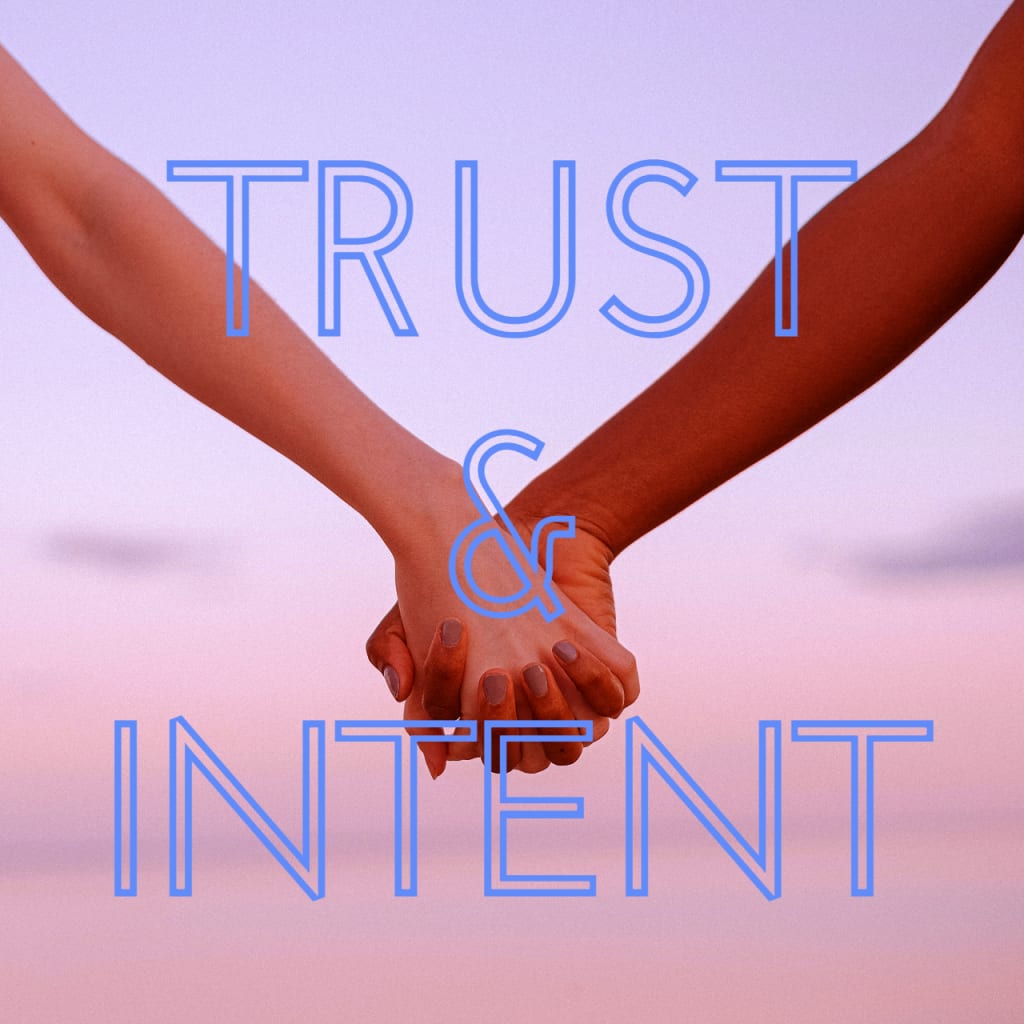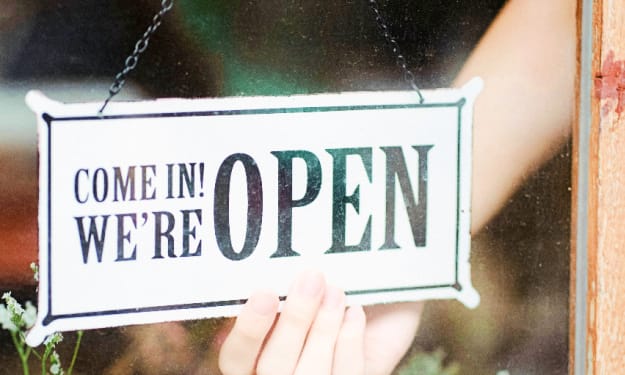Ask, And You Shall Know
A Short Lesson on 'Trust' and 'Intent'

Words are sharp; therefore, I choose to rest the blades when I can.
It has become increasingly difficult to express oneself without triggering the unleashed demons that people battle within them. This is a recurring theme; both on and offline. Having open discussions, making comments, jokes, or even just looking at someone for a little too long is almost guaranteed to shine a bad light on people who probably don't mean any actual harm.
The answer to that issue is simple: many people are beginning to discover what they’re sensitive to. This in itself is a great thing. They’re learning to define their boundaries, what’s healthy for them, what’s acceptable, and what’s simply just not up for debate. It's the last part that's a little worrisome.
I hear it all too often: "Some things you just don't talk about". Or my least favorite: "I don't owe anyone an explanation". That's not going to work; not for the long term. They're phrases that go hand in hand with trauma and as hard as it is, we have to eventually crawl out of those dark places.
We shouldn't remain in places of pain, confusion, or miscommunication forever. Shutting down conversations is the new form of attack people are choosing to remain in their false kingdoms of comfort. In a modern world where words are becoming more powerful and carrying more weight than ever, we owe it to ourselves to dive into why this is happening and discontinue cutting people down in the middle of their expression.
Shutting The Door of Dialogue
Like many other ailments of man, this isn’t anything new. I’m sure many people have quietly suffered these inner curses since the beginning of time.
The introduction of the internet has made it easier for masses of people to learn about themselves by gaining exposure to the rest of the world. Something that otherwise would never have been as easy or even as enticing. This exposure comes in the form of having access to social media, videos, books, reports, and articles such as this one. This comes with a little fee: interacting with people and their perspectives.
Their stories allow us vicariously experience emotions and thoughts we may not have known before. It gives us a chance to form opinions, and help us define who we would like to be in contrast or in tandem with what we experience.
As mentioned before, this is a great thing when we look at the overall picture. After all, one needs to master self-awareness in every aspect - the good, the bad, and the ugly - if we wish to be as sharp as we can.
The immense problem that many people face with that journey is that typically the bad and the ugly are the areas that many people keep buried deep. To be fair, people don't need to walk around proclaiming the worst parts of themselves all the time as if they were some badge of honor.
Even worse, when these negative pieces of the puzzle are left unattended, unrefined, and aren’t integrated properly, they become a poison for the host. As fragile as humans are, it's no secret that poison does our bodies no good. When we've had our fill, we’ve no choice but to try and spit this venom outward lest it destroys us.
This venom comes out in the form of intolerance and ignorance.
These two are quite possibly the only things you need to craft most of the hate and confusion in the entire world. War, segregation, racism, violence, and pain are all byproducts of these two. Worst of all, not many people will care to acknowledge that these poisons are brewing inside with each unresolved conflict they face within.
To give you an example, when someone witnesses something for the first time and asks a question about it, people expect them to know the answer as if it’s always supposed to be obvious. While one can take most things at face value, it’s helpful to ask questions without fearing backlash or judgment for doing so.
The same goes when people form a personal opinion about a ‘sensitive’ topic. It's becoming more evident that people are very quick to shred others apart for having different opinions rather than asking the right questions to gain deeper insight. This is where everything turns into a contest of who’s right or wrong.
Unfortunately, in trying to prove a point people often take aggressive stances rather than opening their minds to new perspectives. This shuts the door to dialogue, and clarity is thrown out the window. Misunderstandings and miscommunication become the soil where nothing but bad seeds are grown.
The result? People stop talking about what might hurt and offend, yielding more unresolved trauma. Naturally, people put up more unhealthy boundaries, and no one dares to question them for fear of retaliation.
So where does that lead? Things have to be spoken about eventually. We should be able to do so without having to tiptoe on eggshells around people all the time. This isn't a free pass to be crass and disrespectful to your fellow man. Instead, I invite you to ask a simple set of questions.
Two Poisons; Two Antidotes
Not many people realize that when conversations are diminished into arguments or pissing contests, rather than grow and expand the limitations of their boundaries, they’re choking on the same poison they’re retching.
It seems that it takes more work for people to say “I didn’t consider that viewpoint before”, and instead choose to fight and forcefully drill their ideas into others. This approach would only make sense if people were dealing with dangerous ideas.
However, more often than not, the quest for knowledge means having to ask what some might consider “stupid” questions.
Intolerant people don’t care to help others understand a particular circumstance or outcome.
They simply get defensive and aim for the jugular, mostly for the sake of proving a point. I've found this lack of patience is what breeds the second stage of an unhealthy individual: ignorance.
Ignorant people are far more dangerous because they willingly refuse to consider any reality outside of the one they create.
Ignorant people have wounds that are hard to heal, and any exposure to challenging ideas is like coarse salt and lime to them. Especially if those ideas threaten to shake or dismantle their prebuilt foundations; no matter how twisted they may be.
The next time you encounter either one of these poisons along your journey, be sure you carry the antidotes of Trust and Intent. To be more clear, you need not worry about other people’s unwillingness to be rational.
Determining if you trust someone is a simple question you ask yourself. In order to understand someone's intentions, you must pose the question directly to them.
Let’s paint a few examples.
Let’s say you’re having a conversation with a close friend when suddenly they bring up a touchy subject like religion or politics. Instead of fearing the worst, let’s begin with trust.
In this scenario, it’s easy to trust a friend, so trying to determine that shouldn’t be too much of a challenge. What you would then need to figure out is what is your friend’s intent when talking about sensitive themes. In other words, what's their goal? What are they looking to learn? Or are they looking to cause harm?
Let's say you're not up for the conversation at that time.
Part of healthy dialogue includes asking questions, and also determining if the time is adequate. If someone doesn't want to talk about something they might find sensitive at that time, then we should honor that.
By the same token, and I mentioned this here, if something you find sensitive goes unresolved for too long then it becomes an unnecessary burden. To do this, you have to dig into those bad and ugly parts, find out why they hurt, and most importantly how to heal them.
Sooner or later in life, you must become comfortable speaking your truths with kindness; no matter how vulnerable it leaves you.
(More on that topic in a different article.)
Continuing on, we need to keep things simple when asking what someone means or what we need to clarify when topics that are considered controversial or “not debatable” are brought up. This is the only way you can determine if someone’s point of view is on a dangerous path, either for you or themselves.
Here’s another scenario that’s a bit more complex. Someone makes a joke and you didn’t find the humor in it. You ask them what they meant and their reply is something vague like “just having fun” or “I’m just kidding”. If the intent was to poke fun but the execution is poor, then in order to dig deeper you could simply examine the outcome. In this case, feelings were hurt and the joke wasn’t what it should’ve been, right?
Now, suppose that you don’t really trust the person’s intention of just “being funny”. Maybe your gut is reading more into it and telling you that there’s real malice and venom hidden behind their supposed joke. Same idea: combining trust and intent is how you can determine if danger is really present or if you’re simply overreacting. With this foundation, you can begin to assess with more clarity if the fight is worth it.
On the other side of the coin, if the intent of the person was to be funny and you trust in them, then you can simply express your displeasure, an apology is offered, and life can hopefully resume with no more confusion. (If only other things could be that easy, right?)
People will sometimes say or do things that don’t mean to be hurtful but are still received that way. So if we can trust a clear explanation of their words/actions, then things should be okay. The same method applies to a lot of other situations where people are trying to forcefully project what they feel on others before even bothering to ask for more clarity. The world will never survive if it remains as black and white as many people are trying to paint it.
Closing Thoughts
People are entitled to feel any way they want and say what they want. This is what free will is all about. The way to establish order is to define people’s intentions and determine if you can trust them.
In my book “The Art of Patience, Gratitude & Courage”, I explain in the last chapter why it’s worth it to examine what you’re passionate about and what are the consequences of chasing that passion.
During that process, you’ll learn to communicate your intentions and teach people to trust you at face value without any extra digging required. If you can do this for yourself and master it, you can then begin to lead by example and show others what it’s like to do the same. The outcomes will often speak for themselves because they’re more likely to end positively.
It won’t eliminate all of the conflicts that exist in the world; we know very well that’s impossible. At the very least, it may improve your relationship with someone who may just wish to speak their truths with kindness and doesn’t intend on spreading more poison with the simple act of expressing an idea, asking a question or posing a healthy challenge to help stabilize a shaky foundation.
About the Creator
The Rogue Scribe
Writer. Narrator. Author of 'The Art of Patience, Gratitude & Courage'.
Challenge the world, go rogue with me, and subscribe to support my wordsmithing.
To read my uncensored articles, head over to: https://theroguepath.blogspot.com/






Comments
There are no comments for this story
Be the first to respond and start the conversation.